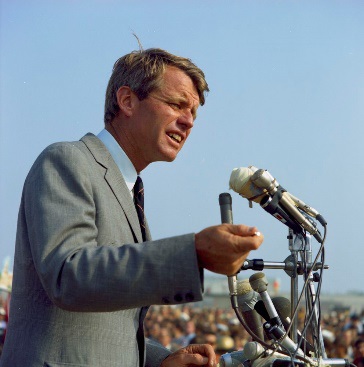50 Years Later:
Former Local Campaign Volunteer Remembers Bobby Kennedy
Written by Justin Lamb

(Courtesy of Kennedy Library)
The year 1968 was fraught with immense political, social, and cultural divisions throughout the United States in what would become one of the most tumultuous years in American history. Many young Americans were dying in the jungles of Vietnam while others were loudly protesting the war at home. Racial tensions reached a zenith following the assassination of Martin Luther King, Jr. and many towns went up in flames as rioters vented their frustrations. Social norms were challenged prompting many of the ‘silent majority’ to demand a return to law and order. The country appeared to be falling apart at the seams.
Due to the war in Vietnam, President Lyndon Johnson’s approval rating took a hit and he was soon challenged on the left by Senator Eugene McCarthy who had the backing of the anti-war movement. On the day of the New Hampshire primary, McCarthy shocked the political landscape when he made a strong showing gaining forty-two percent of the vote to Johnson’s forty-nine percent. The vote total set off an alarm in the Johnsons camp and soon other Democratic candidates who were unhappy with Johnson’s policies began eyeing a run for the presidency. Enter Bobby Kennedy.
Perhaps no other Democrat was as popular as Bobby Kennedy was in 1968. Following the assassination of his brother, President John F. Kennedy in 1963, Bobby Kennedy became the heir apparent to Camelot and the Kennedy political dynasty. Sensing President Johnson’s vulnerability in 1968, Bobby Kennedy announced his candidacy for the presidency in March 1968. Fifteen days later, President Johnson stunned the world when he announced he would not seek another term thus leaving the field for the Democratic nomination wide open. Johnson supporters rallied behind sitting Vice President Hubert Humphrey. College intellectuals, anti-war activists, and upper-class whites supported McCarthy. Kennedy’s base consisted of the ‘forgotten American’ such as the working poor, minorities, and what would become the youth voting bloc.
Benton native Jeri Lovett Harrell was a student at Western Kentucky University at the time and was quickly drawn to the candidacy of Bobby Kennedy whose message resonated with the youth. “I was a member of the Young Democrats club and many of us found out that Bobby Kennedy supported the ideals that we supported such as ending the war in Vietnam, ending poverty in the U.S., and ending racial discrimination.” Lovett-Harrell’s family was very politically involved in the Democratic Party and her father, Benton attorney John Clay Lovett, had been an early supporter of President John F. Kennedy. She had the same early enthusiasm for Bobby Kennedy in 1968. “Young people were energized for the first time and they wanted to be involved in politics in large part because of Bobby. I was eighteen and was excited in voting in my first presidential race.”
Throughout the spring of 1968, Bobby Kennedy campaigned vigorously for the Democratic nomination eventually winning the primaries in Nebraska, South Dakota, California, and Indiana. “I was fortunate to have served on his campaign and met him in New Albany, Indiana while campaigning for him in May,” recalled Lovett-Harrell. “We ran next to his convertible as it traveled through town and followed up with a rally in a local gym.”
But the tragedy that was 1968 continued when Bobby Kennedy’s campaign and life was heartbreakingly cut short on June 5, 1968 when he was gunned down at the Ambassador Hotel in Los Angeles, California. Like so many all across the nation, Lovett-Harrell was devastated to learn of the death of what she described as her ‘political hero.’ “I was attending summer classes at Murray State University when my dad broke the news to me. I remember crying and asking dad why this was happening.” Following Kennedy’s death, the Democratic Party imploded by division and no clear direction thus leading to the election of Republican Richard Nixon in one of the thinnest margins in modern American politics. The death of Bobby Kennedy left many asking ‘what if?”.
“The country would have been much different place if Kennedy would have lived,” stated Lovett-Harrell. “He was a kind, considerate, classy, and knowledgeable person who truly cared about people.”
